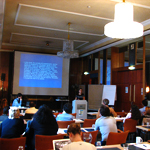From Universalism To Regionalism: Europeanization And Its Reflections Upon Turkey
-
-

-
Presentation speakers
- Cemile Arikoglu Unducu, Thrace University
- Download presentation
Abstract:
Europeanization is a new concept in the literature that has found its meaning with the political, economic and social inclusion of Central Eastern European (post-communist) countries in the process of European integration in 2004. The European Union (EU) through transferring its own values, norms and policies to member countries in the process of enlargement, has become a tool for establishing a new European identity. Establishing a European identity is crucial in establishing a common future within the context of Europeanization. Thus, European identity should be established based on values such as human rights, democracy, peace, freedom and diversity even though it cannot be built on factors such as a common religion, history, culture and geography. Europe, through adopting these values, constitutes its self-definition and functions as an umbrella for different identities. The driving force of Europeanization is the principle of conditionality, concrete basis of which has been formed with Copenhagen Criteria and acquis communautaire. However, for the principle of conditionality to be maintained, socialization is needed. That is to say, internalization of norms is crucial. Europeanization is a process of cultural transformation; what it stands for is a new identity, policy change, administrative innovation and modernization. Europeanization transforms the structure of nation-state together with meanings attached to it. It highlights European identity instead of national identities. In this study, the concept of Europeanization and the efforts for establishing a European identity in which democratic values are addressed independently from state will be analyzed. The study primarily seeks answers to the questions “What’s Europe?”, “Who is European?” in the fields of geography, history, culture and politics. Secondly, European integration and European identity are analyzed within an historical perspective, and the subjects of European citizenship and European constitution that are popularly discussed in Europe are tried to be clarified. In order to avoid conceptual confusions in terms of Turkish modernization, the concepts of Modernization- Westernization and Europeanization are classified. Then, the concept of Europeanization is analyzed and its driving force in practice, “the principle of conditionality” is explained under the titles of “Acquis Communautaire”, “Copenhagen Criteria” and “Socialization” which are significant in terms of both Turkey and Europe. Finally, Turkey’s perception of the concept of Europeanization and the EU vision and politics about Turkey are analyzed. -






















